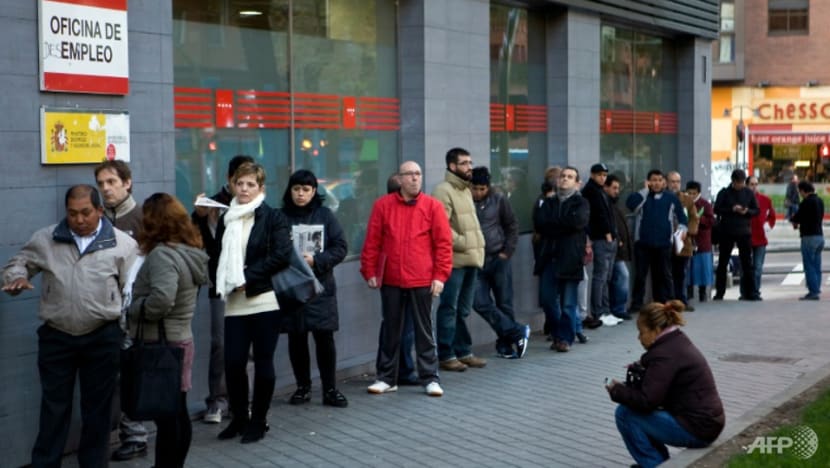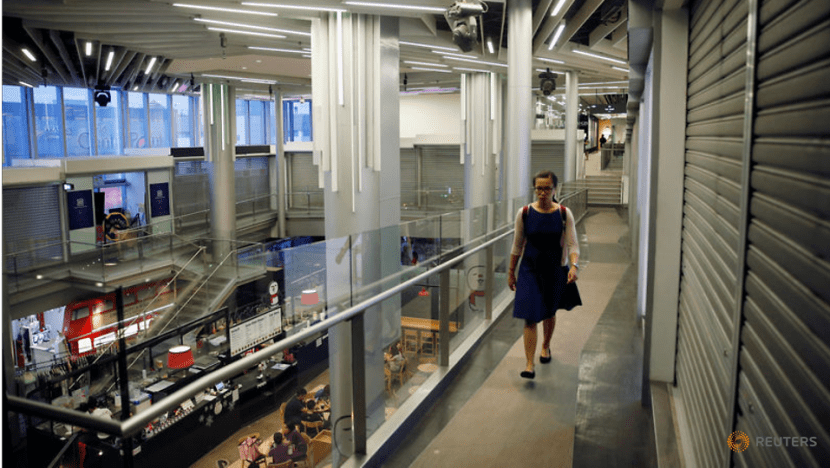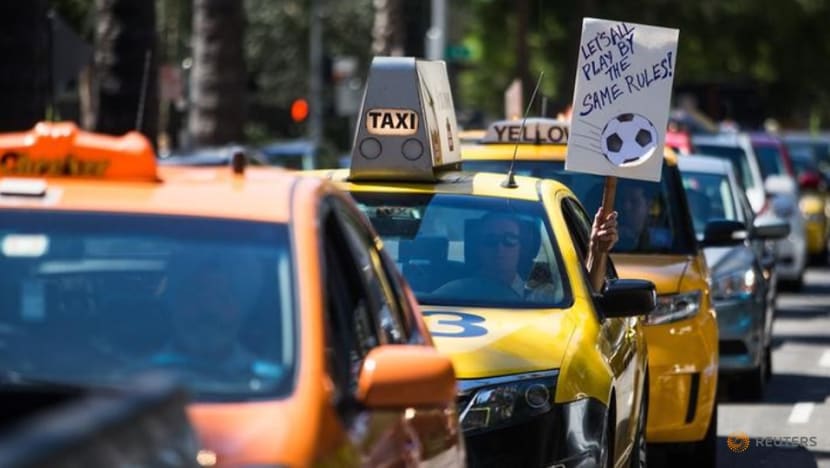commentary Singapore
Commentary: The future of work – new underclass, dystopian reality?
Two forces combining to reshape the future of employment can have implications for our social compact and national security, says S Rajaratnam School of International Studies’ Shashi Jayakumar and Eugene Goh, chief operating officer of a shift worker hiring platform.

Spain has one of the highest jobless rates in the eurozone, with 4.78 million people out of work at the end of 2015. (Photo: AFP/Sebastien Berda)
SINGAPORE: The dust will take decades to settle on the key issue of precisely how much technology and artificial intelligence (AI) will displace human labour.
But it is already clear the coming decades will see a sizeable proportion of jobs worldwide threatened and substituted by automation, machine learning, or a combination of both.
It is increasingly apparent too that jobs commonly reckoned to be “safe” at present may in fact be candidates for an AI takeover, with many knowledge workers themselves candidates for displacement.
Research by McKinsey from 2015 suggests that current technologies alone could automate 45 per cent of the activities people are paid to perform.
The effect, as some experts have pointed out, will be comparable to the industrial revolution.
At the same time, workers are demanding, and companies are offering, greater flexibility in work arrangements.
Unlike the past, when the vast majority of work was full-time employment, bundled with benefits such as pension and healthcare, the future will be much more varied.
Contractually, there will be full-timers, part-timers, freelancers, contract workers, and other forms of relationship between companies and the people that supply them with labour.
Work hours may be shift-based, flexible, self-determined, or totally undefined, so long as agreed output is delivered on time.
The upshot: What people do and how they are contracted to do it will be very different from the old models, and the very concepts of “jobs” and “careers” will need to evolve.
People have throughout history moved to new jobs as old ones are destroyed. Some believe this will happen again, while others suggest that this time the outlook is actually far less positive.
We should all ponder the future not just for the winners of the employment stakes of the future, but the losers too, particularly if the intensity of disruption increases.

THE HAVES
The future will see a great deal of knowledge work automated. IBM’s Watson computer, which won the American TV quiz Jeopardy in 2011, is now being used to devise treatments for some cancer patients in the US.
AI is even making inroads into fields like journalism, with some attempts showing that machine efforts are almost on par with that of human writers.
This does not necessarily spell disaster for humankind. There will be an elite that manages to ride the AI wave.
Individuals in this group will have skills - creativity, abstract thinking, intercultural sensitivity, and the ability to thrive in ambiguity – that computers and AI will take a great deal of time to master.
There will also be opportunities for individuals in tech-enabled growth areas like computer science, robotics, education and healthcare, in particular opportunities in catering for an ageing population, possibly working alongside AI.
THE HAVE NOTS
Shifts in wealth will invariably continue as AI and automation technology enable robots and algorithms to do an increasingly wide range of tasks.
The likelihood is that those who control and shape AI will gain power and wealth.
One noted AI expert Yoshua Bengio has spoken of “AI worsening the effects and concentration of power and wealth that we’ve seen in the last 30 years.”
There are two groups of people we should be concerned about.
First, those who risk seeing their skills become obsolete and have difficulty picking up new skills. Learning new skills is likely to be more challenging for older workers, as well as those with lower education levels.
The focus for these individuals needs to be on retraining, to enable them to take on new jobs, either in the same industry or in a new one.

The Singapore Government has already put in place significant infrastructure to support training, and to empower individuals to shape their own training journey through the SkillsFuture programme.
This recognises that companies alone cannot be responsible for all the post-education skill creation in the economy. Instead, individuals must take charge and drive their own development.
Secondly, we should also look closely at the seeming promise of jobs in “the gig economy”.
The gig economy does have its benefits – in supplementing income, buffering against unemployment, and providing flexible work options. More broadly, the sharing economy, enabled through platforms like AirBnB allows the monetisation of assets.
The story in the long run may be different.
Websites that match employers with freelancers are growing fast – but so is the potential for lower wages and inequality.
While the gig economy might bring to mind images of professionals choosing to freelance from the comfort of their penthouse lofts, the reality is that the majority are at the opposite end of the spectrum.
Companies are turning to these arrangements to cut costs – both in terms of salaries, since they only pay when they need work done, and in terms of benefits.
Most gig economy workers do not qualify for statutory benefits such as paid leave, medical leave and health insurance.
The net effect is a transfer of risk and cost from corporations to individuals - unfortunately, often the most vulnerable individuals who are least well-placed to bear them.
This group – particularly those for whom such gigs are their sole source of income – are badly hit by the combination of volatility in the income stream, since suitable work may not be found in a timely fashion, and the lack of statutory benefits that typically accompany permanent employment.
Besides the loss of perks such as health benefits, individuals caught in these jobs often have less incentive to upskill themselves.

It is not without reason that Guy Standing, professor of economics at the School of Oriental and African Studies, has pointed to the dangers of a coming “precariat”, which he defines as an emerging global class with no financial security, job stability or prospect of career progression.
The irony: Far from delivering utopia, technology and flexibility in how we work could potentially perpetuate an underclass.
CREATING A PERMANENT UNDERCLASS
A rising gig economy has national security implications.
Research into the roots of radicalism has shown that in some cases, a loss of hope and sense of progress for the future can play a part in an individual’s descent.
The risk is that the gig economy creates a permanent underclass of people who do not see any way out of the gig economy - just endless stasis.
There are no prospects of advancement, and the moment they try to stop, they get thrown off the treadmill.
For people who have been displaced by technology from full-time work into the gig economy, with low pay, no prospects, no fixed schedule, and limited social engagement, a sense of anomie is one plausible outcome. Their futures, from their own vantage point, will be debilitating, plagued by uncertainty.
For how long will these people continue to be in the gig economy, coming to fix your wifi or driving you around for minimum wage?
At the macro level, we may face a future where there will be a permanent strata of rights-based movements or groups campaigning in the name of social justice – under the banner for example of those who have been left out of the very bright technologically-enabled future.
There are already people arguing for universal basic income as a response to this change.
Some of these movements need not necessarily be violent, but are certainly socially destabilising.
Consider for example recent protests over local politics, gentrification, and the cost of living that have surfaced in San Francisco, targeting the giant tech companies based in Silicon Valley.
These have seen loosely organised activist groups blocking shuttle buses used by tech employees, breaking windows and picketing the homes of Google executives.

Might we also see a revanche to the Luddites of the nineteenth century – individuals seeking to wreak revenge on technology?
The Luddites of the early nineteenth century lived in an era of “reassuringly clear-cut targets—machines one could still destroy with a sledgehammer”, notes Steven E. Jones in his 2006 book Against Technology.
But the technology that takes over jobs and runs most of our lives will not present such a clear-cut target, potentially resulting in the unhappiness being channelled toward other targets instead.
It is also not too far-fetched to see these forces allying with other ideologies - even metastasising into violent protest and action. Security officials tend to ignore these sorts of possibilities, preoccupied as they are in the Islamic State age by the jihadist threat.
But the threat is real. In 2010, Swiss police intercepted a car filled with explosives destined for an IBM nanotechnology facility near Zurich. The individuals apprehended were green activists.
In 2012, shadowy anarchists claimed responsibility for the shooting of Roberto Adinolfi, an Italian nuclear engineering executive.
The faint but growing signals of anarchists coming back onto the national security radar should concern us.
They are not necessarily thrown out of work by automation, but convinced, perhaps, that existing forms of government have failed in the globalised and technologically enabled age.
John Maynard Keynes took the view that technology and machines would increase productivity to such a degree that the main challenge people would face was what to do with a surfeit of leisure time. That utopia has yet to materialise.
He also theorised that as a greater proportion of the population found themselves liberated from the “economic problem” of struggling for subsistence, society might suffer from a “general nervous breakdown”, not knowing how to readjust.
A sort of breakdown might come to pass, but not the one Keynes envisioned.
Instead, one of the real issues of our times may well be what people involuntarily displaced by technology and unable to adapt to new ways of working do with the time they have on their hands, and the implications this has for the rest of society.
Shashi Jayakumar is head of the Centre of Excellence for National Security and executive coordinator, Future Issues and Technology at the Rajaratnam School of International Studies, Nanyang Technological University, Singapore. Eugene Goh is chief operating officer of a leading shift-worker hiring and management software startup based in Singapore.
















